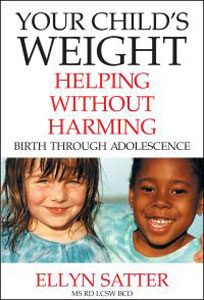

Family Meals Focus
The Ellyn Satter Institute Newsletter
Edie’s stories
by Ellyn Satter, Registered Dietitian and Family Therapist
April, 2010. We are bereft. Edie Applegate, MS, RD, dear friend and charter member of the Ellyn Satter Institute, died March 20. Edie was only 71. Those who love her feel cheated. But life goes on, and so do Edie’s feeding stories. Here are a few.
“Having food you love makes managing diabetes possible.”
Edie was proud of being an RD, and worked for many years as a clinical dietitian at Rockford Clinic. About diabetes management, she said, “I address beverages and eating regular meals and snacks and that takes care of things.” Her observation was that “having food that you love makes managing diabetes feel possible.” After a lot of campaigning by Edie, the endocrinologist came to believe in her down to earth approach and gave his patients the same advice as he sent them off to an appointment with Edie.
That same endocrinologist starred in Edie’s story about 5-year-old Zack. At every meal, Zack ate until he threw up. Zack’s weight was accelerating, he thought about food all the time, and he constantly begged his parents for food handouts. The doctor said, “three meals and three snacks.” The parents did what he said, and when Edie saw them 2 weeks later, Zack had stopped throwing up. Come to find out, the extremely busy and frequently absent parents had had meals whenever they got around to them. Zack was so afraid of going hungry that he ate as much as he could, whenever he could.
Edie was not distracted by the swirl of issues
Edie was a warm, laughing, grandmother figure who would bless the food, be firm about structure, and let the parents find their own successes.
Edie called her retirement practice Down-to-Earth Dietetics, where she worked with Head Start and Illinois Early Intervention for Children with Special Health Care Needs. Feeding dynamics was a perfect fit for Edie and for the two programs. She was a warm, laughing, grandmother figure who would come in and bless the food, be firm about structure and let the parents find their own successes. Patty Morse, who also worked with the Early Intervention program, says, “I will learn from Edie for the rest of my life! Edie and I compared notes about our cases. I would be overwhelmed-the medical problems, the financial and social issues-all that the family was dealing with. Edie would say, ‘I always start with what I know could help this family.’ She did her research-medical information, patient chart, phone calls–but she was not distracted by the swirl of issues. She saw through to the core issue of the parent-child feeding relationship.”
Edie loved people and took such an interest in them. She laughed when she told of a mother who lamented her dislike of vegetables and her difficulty eating them. Come to find out, the mother loved peppers and used them in great quantities. Because she liked them so much, it hadn’t occurred to her that peppers were vegetables! Edie was delighted with a family who used their chimenea to bake bread and was excited about going back to eat bread with them.
Edie talked so others could hear
Edie found ways to talk with people so they could hear her. She said children’s eyes always lit up when she asked them (in front of their parents), “Would you like your parents to play with you?” About her success with a poorly growing infant, Edie observed, “His mother stopped feeding when he emptied his bottle. I encouraged her to make another one.” About the futility of asking a toddler what he wants to eat, “they don’t know what they want until it is in front of them.” She wondered to a family who was spoon-feeding a reluctantly eating toddler “what would happen, do you think, if she tried feeding herself?” They put some morsels on the child’s high chair tray and she ate. “Magic!” Edie said, and they all shared a good laugh.
Explore
For more information for parents about optimum feeding to help children grow up to get bodies that are right for them, see Your Child’s Weight: Helping Without Harming.

